Sep 24, 2020
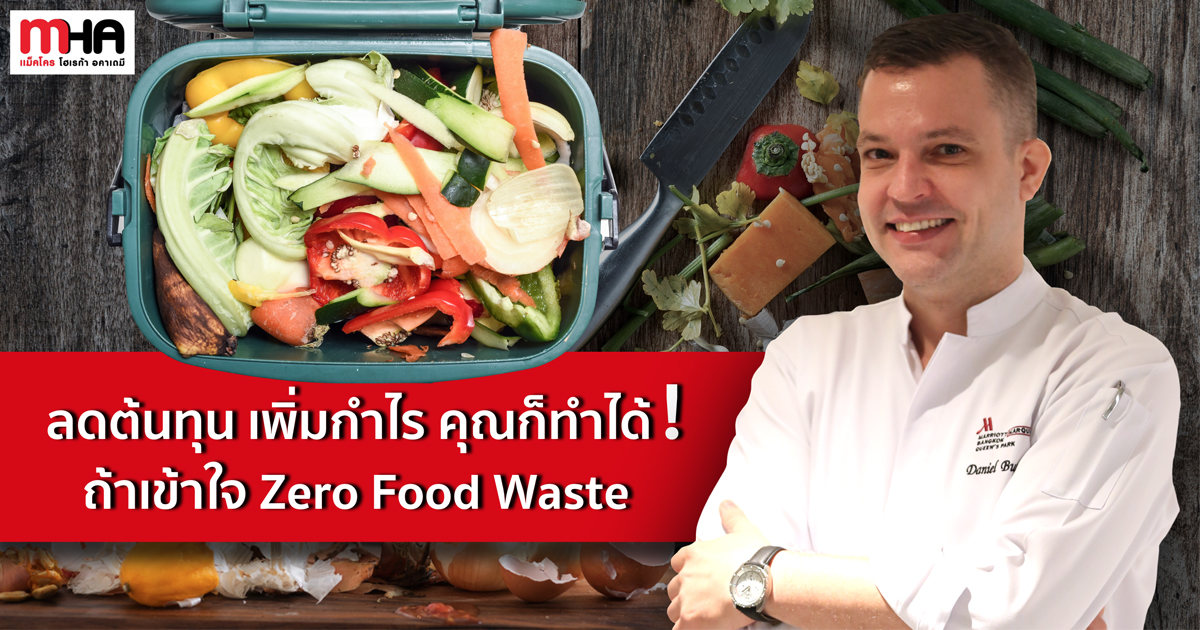
Many business operators should know that “food waste is a problem in global level” which cause numbers of environmental problems. There are requirements to the business operators to start optimizing their business to keep up with this trend. Reducing food waste also have other benefits, especially cost control. There are still many dimensions regarding food waste topics. In order to let everyone understand thoroughly what Food Waste really is, how important the Food Waste Reduction is to your business, and to light up all business owners to start Zero Food Waste Management to reduce Food Waste in your restaurant, we would like to invite all of you to talk with the specialist in this topic. Please welcome Chef Daniel Bucher, Executive Senior Sour Chef of Bangkok Marriott Marquis Queen’s Park Hotel. The first five-star hotels to be certified by The Pledge, the organization to specify independent standard to fight with global Food Waste problems.
"The first and most important thing is that you need to recognize that you are facing a problem. I guarantee that everyone, every business, has food waste problems. I'm 100% certain of it. However, everyone can do better."
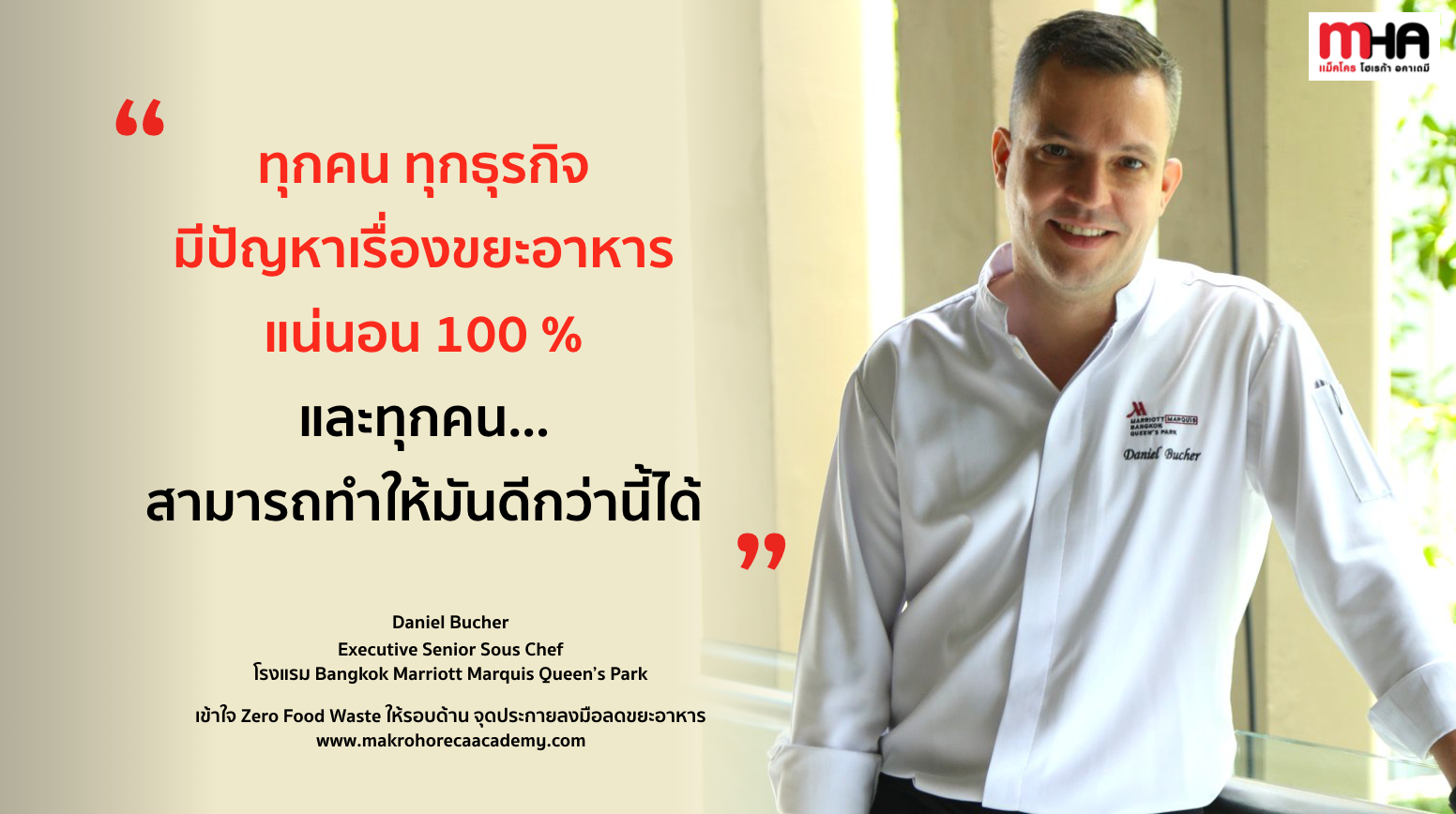
What really is zero food waste?
“That's a good question. Some people think zero food waste means not wasting food at all, but that's impossible since you can't use every ingredient. For example, when you peel a water melon, only part of it can be eaten and some parts have to be thrown away. So, zero food waste is not eating everything and having no scraps. Instead, it means trying to minimize food waste in the environment. This is essential, because it means there won't be food waste to bury, as it will be disposed of in other methods such as by fermenting it into fertilizer, donating it, etc.
There are two things that need to be thoroughly considered about this.
- Try not to create any food waste for disposal by burial, because it can cause a lot of pollution and environmental impact. Many people probably already know that food waste problems are related to environmental problems. Up to 8% of greenhouse gases are produced by food waste, which is capable of producing methane gas that's up to 14 times more harmful than carbon dioxide, contributes to global warming and creates pollution when disposed of by burial in an unsanitary manner.
- What is the acceptable amount of food waste? What is the amount of food that you should buy to serve to customers, so they can feel full and happy and that the money they spend is worthwhile, so that they feel good and impressed with services upon walking out of a restaurant or a hotel? We have to produce as little food waste as possible.
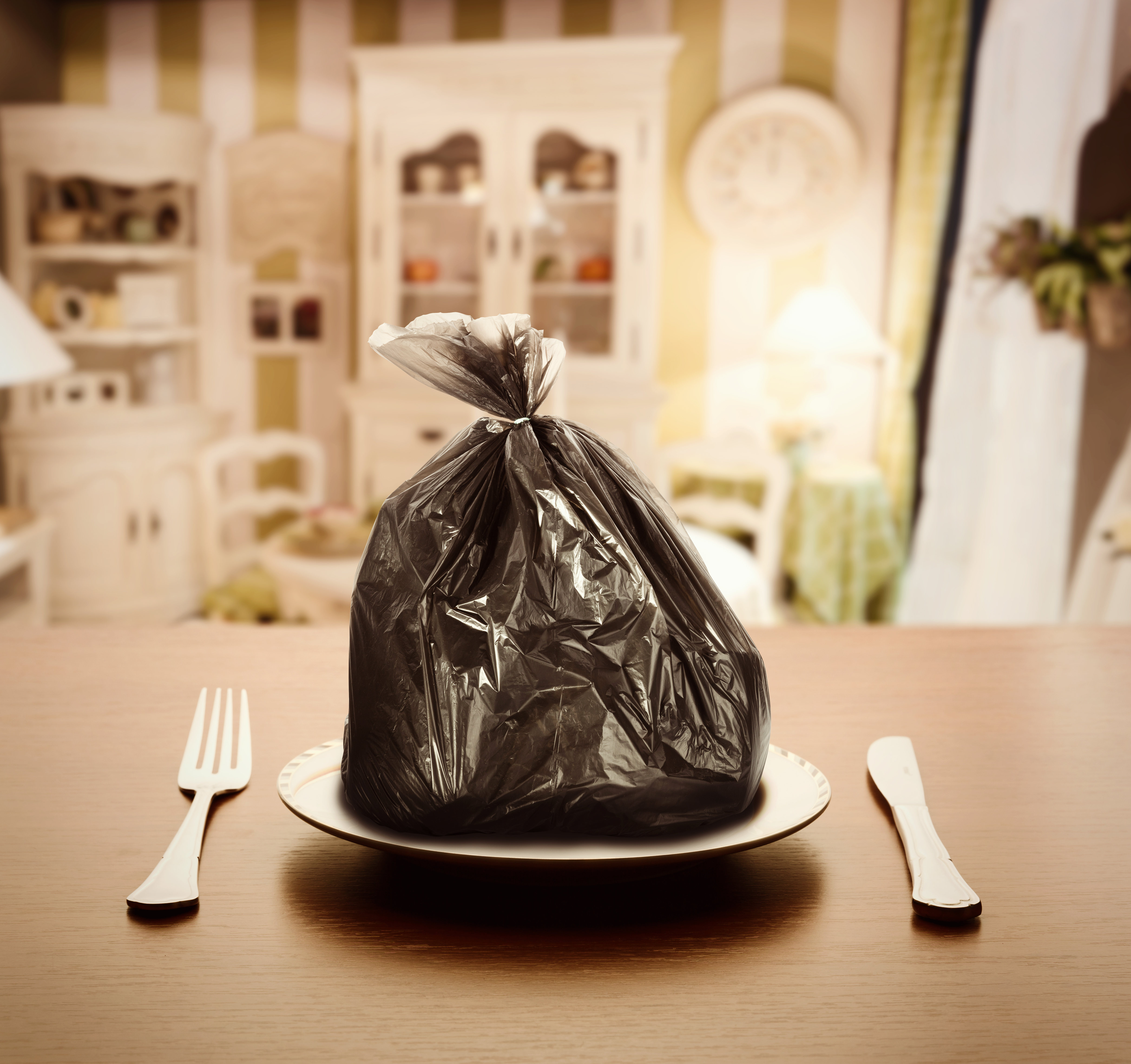
How can you dispose of food waste?
“In briefly discussing food waste disposal guidelines and methods, we can divide them into the following five steps:
- Prevention – Prevention and reduction of food waste at the source is the most important step.
- Optimization – Allocate edible food for maximum benefits by giving to people in need or using as animal feed.
- Recycle – Subject food waste to production processes for reusing it such as in the production of biogas by anaerobic fermentation and production of fertilizer for agricultural usage.
- Recovery – Dispose of food in a manner that permits energy recycling such as by incinerating low-moisture foods to produce heat energy. As high-moisture food requires a high amount of incineration energy and causes more pollution than low-moisture food, it is necessary to dehydrate it before incineration by using heat energy.
- Disposal – Food is disposed of by incineration or burial.”
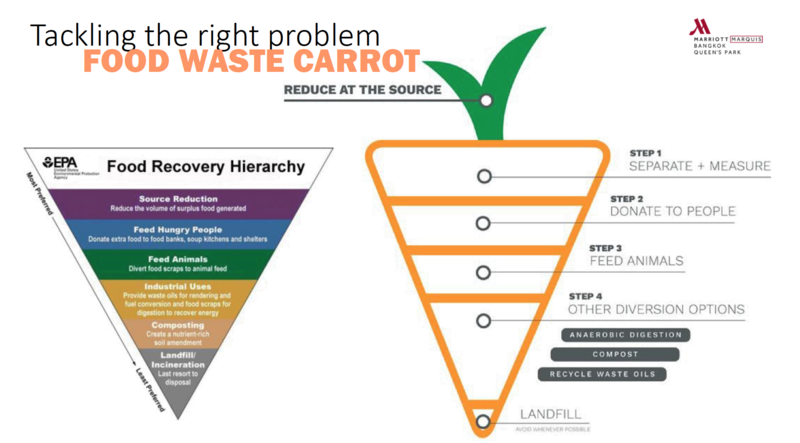
How do we solve this problem?
“For small restaurants who often find this problem, it shows that how good you are to store raw material? How good you are to manage the menu? If you have a lot of Food Waste, the first thing you can do is to go back to check out on your menu that which one should be sold and which one should not be. Observing the amount of food waste helping you to learn how well your business is going.
The more you have left, the more intelligent you have to run your business. This problem is even worse for small restaurant to control cost, especially that many restaurants are impacted by Covid-19. Your revenues come slower causing you to run out of cash on hand. If you don’t want to pay extra cost, you really need to manage it well. For examples, you may need more refrigerators but should I buy it now? I couldn’t decide until I looked back on the issue that we have to throw away 10 percent of our rotten food, So, if I buy new refrigerators I will be able to save.”
How should you begin applying the zero food waste concept in restaurants?
“The first and most important thing to do is to understand that you have a problem. Then you have to seriously look at that problem. Of the 99% of conversations I had with restaurant owners, chefs, hotel owners and others, they all said the same thing, "We don't have a food waste problem." Everyone admits and say, "Yes…we have a global food waste problem", but nobody admits that their business has that problem. However, I guarantee you that everyone, 100%, has a food waste problem. So, I think understanding this problem and admitting that you have the problem is very important. That's because people who are asked this question often think that you're blaming them, but I don't think that way. I don't think we should blame anyone. Everyone is in the same food system, and there are many factors contributing to this problem. So, the first thing we have to do is admin that everyone, every business, has a food waste problem and that everyone can do better. If you can admit to the existence”
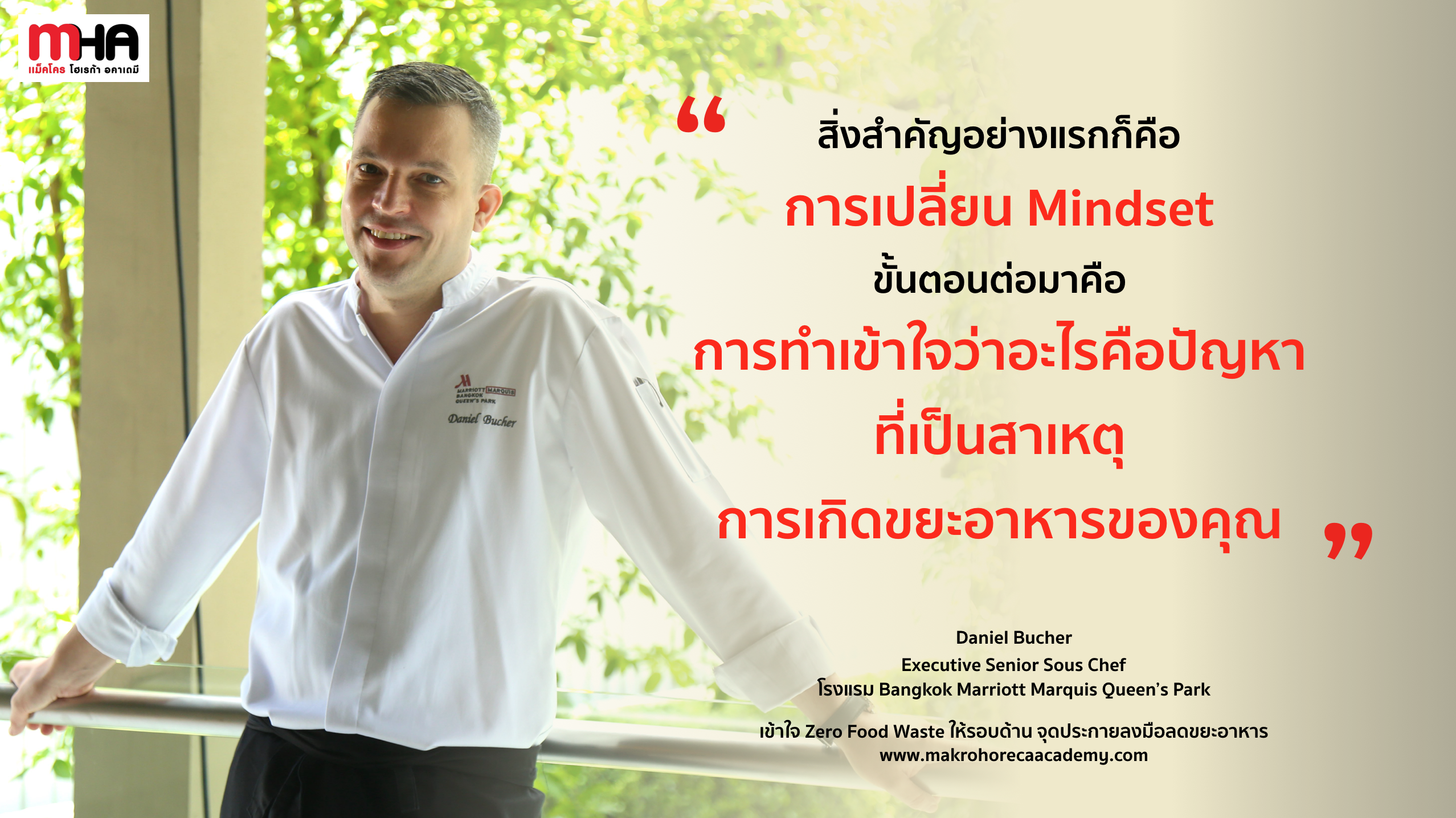
"The first important thing to do is change the 'mindset.' The next thing to do is to understand the causes of your food waste."
“The second thing every business should do is try to understand and identify what and where their business problems are. Perhaps this can be achieved by starting with simple methods such as accounting and waste sorting and waste volume measurements. You can try to just observe what kinds of things you have in your trash bins every day. That's all you have to do. You don't even need to buy expensive machines. Just seriously take a look, three times a day, what's thrown away. Then you write, memorize or take pictures of them. For example, if you find a lot of meatballs being thrown away every day, maybe you can try weighing it every time before you throw it away. If you find the weight to be two kilograms every day, after a month that will be 60 kilograms. If you know that, you will realize on your own that you need to buy two kilograms less each day. That's a very simple yet highly effective method.
But the first important thing to do is change mindsets. Then it's understanding the causes of your food waste. These are things every business can do. The third step will vary depending on each person's business. Once you know what your wastes are, I'm sure that you will naturally learn how to deal with them. Once you have a clear picture of what you're wasting, you will immediately come up with ideas on how to solve it.”
